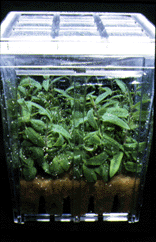December 12, 1995
New process to produce cloned trees for pulp wood
Nippon Paper Industries Co., Ltd.
 |
Nippon Paper Industries Co., Ltd. have been successful in developing the mass production devices of elite clones for afforestation jointly with Professor Michio Tanaka, Science of Agriculture Department of Kagawa University. The new method is the Culture Pack Rock Wool System innovated for the first time in the world.
FEATURE OF LOW COST AND HIGH QUALITY
It is well known fact that Eucalypti such as Eucalyptus citriodora and E.globulus are the excellent pulp wood. However, the plantlets produced by conventional seeding procedure has been regrettably less uniform genetically, which caused a different growth rate of individual tree.
It was therefore anxiously seeked to develop the innovative method of propagation of a clone of elite quality to make the uniform, fast growing and high density trees.
Finally we have succeeded in materializing a method of mass production of species at the low cost.
Micropropagation of plants has been conventionally grown in glass and/or plastic culture vessels with agar media containing sugar, and these plantlets have turned out to be poor rooting formation and low survivability during the period of acclimatization, which has been the serious problem in the micropropagation process.
Whereas, when the shoots are cultured in the rock wool soaked with a sugar free liquid media and incubated under the carbon dioxide enriched condition in the Culture Pack Rock Wool System, the photoautotrophy of plantlets is accelerated to shorten the time to grow. These fast growing plantlets are evidently not only more vigorous in appearance but also easier and more efficient than the conventionally cultured one.
The Culture Pack Rock Wool System undoubtedly provides an epoch-making function to produce the clone plantlets for pulp wood by simplifying the procedure coupled with the elimination of troublesome process used in the conventional methods. Furthermore, the additional benefit is that the system can be applied to the other useful species.
ACTION PLAN
We are going to afforest cloned plantlets produced by this system. The area to be afforested would be selected according to the species character.
Southeast Asia should be suitable for E.citriodora. We have considered that the tropical areas would be appropriate for future potential experimental development. We asked Professor C.J. Goh, Head of Department of Botany, Faculty of Science, National University of Singapore to experiment our proposed method. He has valued our system in terms of capability of producing the millions cloned plantlets and indeed given us his full support for preliminary afforestation.
We visited his laboratory and arranged the experimental program in details and initiated the implementation of propagation of clones plantlet E.citriodora., and etc. at the University.
THE CULTURE PACK ROCK WOOL SYSTEM
The system was developed by Professor Michio Tanaka with the Daikin Industries, Ltd. (Japan) in 1988.
The pack is a box-shaped film culture vessel, and film is made of fluorocarbon polymer holding high gas permeability and heat stability.
Shoots are put on the rock wool in the pack to produce cloned plantlets.
The rock wool is supplemented by liquid media.
This system is reportedly believed to be useful for many horticultural process for growing a variety of plantlets.
The method has identified to be effective in simplifying the process and lower the production cost.
Nippon Paper Industries have taken up for the first time the "Miracle Pack", newly developed by the BIO-U Inc.